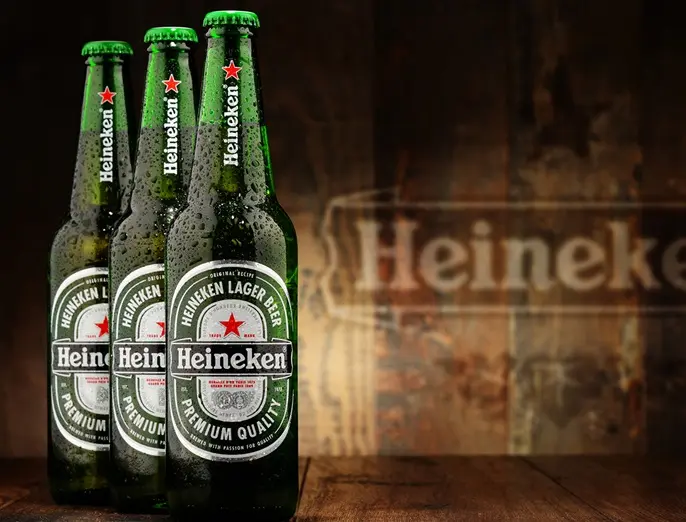When we think about enjoying a cold beer, especially a well-known brand like Heineken, we often consider its taste, aroma, and the experience it provides. However, for those mindful of their dietary intake, understanding the caloric content of their favorite beer can be just as important. This article delves into the caloric content of Heineken beer, providing a detailed yet straightforward exploration suitable for both beer enthusiasts and those keen on maintaining a balanced diet.
Heineken, a renowned Dutch beer, has been a favorite among beer drinkers for over a century. Established in 1873, Heineken has become synonymous with quality and tradition. Its distinct green bottle and red star logo are recognizable worldwide. Known for its smooth, slightly bitter taste, Heineken is often enjoyed in social settings, from casual gatherings to formal events.
Understanding Calories
Before we dive into the specifics of Heineken’s caloric content, it’s essential to understand what calories are. Calories are a unit of energy. They measure the amount of energy food and beverages provide when consumed. Our bodies use this energy to perform various functions, from breathing and thinking to physical activities.
The number of calories in a beverage like beer comes from its alcohol content, carbohydrates, and sometimes fats, though fats are not typically present in significant amounts in beer.
The Caloric Content of Heineken
A standard serving size of Heineken beer is 12 fluid ounces (355 milliliters). In this serving size, Heineken contains approximately 150 calories. This number can vary slightly based on the specific product, but for the standard Heineken Lager, 150 calories is a reliable average.
Breakdown of Caloric Content
Alcohol: The primary source of calories in Heineken comes from its alcohol content. Alcohol provides about 7 calories per gram, which is almost double the calories provided by carbohydrates or protein (both at 4 calories per gram).
Carbohydrates: The second source of calories in Heineken is carbohydrates. These are primarily in the form of sugars and starches that are used during the fermentation process.
Proteins and Fats: Beer generally contains minimal amounts of proteins and fats, so these macronutrients contribute negligibly to the overall caloric content.
Detailed Nutritional Information
For a more comprehensive understanding, here’s a breakdown of the nutritional content of a 12-ounce serving of Heineken:
Calories: 150
Total Fat: 0g
Sodium: 10mg
Total Carbohydrates: 11g
Sugars: 0g
Protein: 1.3g
Alcohol by Volume (ABV): 5%
Comparing Heineken to Other Beers
To put Heineken’s caloric content into perspective, it’s useful to compare it to other popular beers:
Budweiser: Approximately 145 calories per 12 ounces
Coors Light: Approximately 102 calories per 12 ounces
Guinness Draught: Approximately 125 calories per 12 ounces
Miller Lite: Approximately 96 calories per 12 ounces
As evident, Heineken falls in the middle range of caloric content compared to other beers, making it neither the lightest nor the heaviest option available.
See Also: Understanding the Caloric Content of Meiomi Pinot Noir
Factors Influencing Caloric Content in Beer
Several factors can influence the caloric content of beer, including:
Alcohol Content: Higher alcohol content generally means higher calories. Heineken’s 5% ABV contributes significantly to its calorie count.
Residual Sugars: Beers that leave more residual sugars after fermentation will have higher carbohydrate content, thus higher calories.
Ingredients: The types of grains and adjuncts (like corn or rice) used in brewing can affect the calorie content.
Brewing Process: Different brewing processes can extract varying amounts of fermentable sugars, impacting the final calorie count.
Impact on Diet and Health
Understanding the caloric content of Heineken is crucial for those who are mindful of their caloric intake. While enjoying a beer occasionally is unlikely to have a significant impact on one’s diet, regular consumption can add up.
Weight Management
Calories consumed in excess of what the body needs can lead to weight gain. Given that a 12-ounce Heineken contains 150 calories, drinking several beers in one sitting can contribute a considerable amount of calories, potentially leading to weight gain if not accounted for in the overall daily caloric intake.
Nutritional Balance
While Heineken provides some carbohydrates and a small amount of protein, it lacks essential vitamins, minerals, and other nutrients. Therefore, it should be consumed as part of a balanced diet, where the majority of calories come from nutrient-dense foods.
Enjoying Heineken Responsibly
Moderation is key when it comes to enjoying Heineken or any alcoholic beverage. The Centers for Disease Control and Prevention (CDC) defines moderate drinking as up to one drink per day for women and up to two drinks per day for men. Exceeding these recommendations can have adverse health effects beyond just weight gain, including increased risk of certain diseases and alcohol dependency.
Tips for Moderate Consumption
Set Limits: Determine in advance how many beers you plan to drink and stick to it.
Alternate with Water: Drinking water between beers can help pace consumption and keep you hydrated.
Choose Smaller Serving Sizes: Opt for smaller bottles or cans to reduce the amount of beer consumed in one sitting.
Be Mindful of Snacking: Beer is often accompanied by snacks, which can add extra calories. Choose healthier snack options like nuts or vegetables.
Conclusion
Heineken beer, with its 150 calories per 12-ounce serving, is a moderate choice in the world of beers. Understanding its caloric content helps consumers make informed decisions about their intake, contributing to overall health and wellness. Whether you are watching your weight, managing your dietary intake, or simply curious about the nutritional content of your favorite beer, knowing the calories in Heineken can guide you in enjoying this classic beverage responsibly.
In summary, Heineken’s caloric content is primarily driven by its alcohol and carbohydrate content. With moderate consumption and a balanced approach to diet and lifestyle, Heineken can be enjoyed as part of a healthy and enjoyable life. Cheers to making informed choices and enjoying every sip responsibly!


